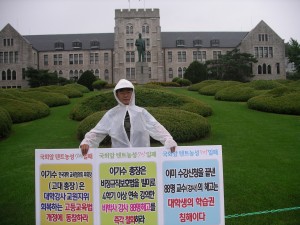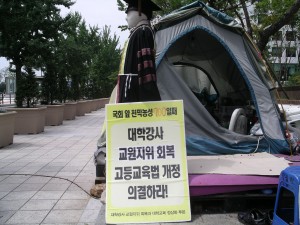University Lecturers (adjunct professors in US terms) of Korea Sit-in 960 Days –
Revise the Higher Education Act of Korea to Restore the Status of Teachers (educator)!
Why are university lecturers committing suicide in Korea?
Very similar to more than half of Korean workers who are irregular workers, university lecturers who have no tenure (permanent status) are ‘irregular’ (without formal affiliation and benefits) and in constant job insecurity. Seven lecturers have committed suicide since 1998, facing hardship and humiliation after obtaining their PhDs with sacrifice and many hopes. For the sake of the lecturers, the university students and their parents, and a just and high quality education system, is time to reverse this and restore to lecturers and irregular professors the status of teacher (or educator).
What are the working conditions of the lecturers?
Lecturers are only part-time workers and are not considered ‘teachers’ with all the benefits of teachers under Korean law. Most lecturers are doing self-censorship to keep their affiliation and have the chance to be employed as full-time professors. Full-time professors and lecturers can not cooperate in research and education, the former work is heavy. Lecturers lecture half of all subjects taught but the salary is 5-10% of regular professors.
Universities have laid off 1,219 lecturers, in fact, out of 5,000 ~ 10,000 lecturers in 2009. One lecturer from Chung-Ang University, Jin Jungkwon, criticized the University president’s sexually harassing words to a girl student and was fired. Lecturers can be fired virtually without cause or hesitation. They cannot easily be active in unions or speak out about their exploitation for fear of job loss. Lecturers are often fired with a phone call or text message – it is so simple and easy to dismiss them.
The number of lecturers is 85,000 in Korea, while total number of irregular professors is 135,000. Yet the number of regular professors is 55,000.
Since 1998, seven lecturers have wanted to change the lecturer system and have committed suicide in their sorrow and frustration.
Dr. Han Kyoungseon of Keonkook University went to University of Texas at Austin and committed suicide, leaving her will to be carried out by KBS TV. Similarly, professor of physics Lee Seongik of Sogang University professor committed suicide in 2010.
How did this situation start?
Originally lecturers were recognized as teachers, under the Korean Constitution. However the ruling dictator, Park Chung-hee, in the 1970s, had wanted to keep the presidency permanently and kicked out the faculties and students who demanded democracy out of college.
He deprived the status of teacher (which has certain work benefits and title) from young lecturers who were critical of the dictatorship and taught students about democracy in 1977. This is same as in the Philippines under Marcos, or Indonesia under Suharto. This system is a major cause of the corruption of the university.
Three ruling and opposition party members have submitted bills to revise the Higher Education Act to get back status of teacher to lecturers in the 17th session of National Assembly. But due to lobbying and oppression by the Korean Council for University Education and Korea government’s irresponsibility, the same bills still have not been voted on in the current 18th legislative session.
Only two elderly lecturers are continuing to do 960 days of sit-in in a small tent in front of the National Assembly since 7 September 2007. Lecturers, students, parents and citizens are doing solidarity demonstrations at 12 places nationwide.
What is the impact on Korean society?
Korea has entered into society of knowledge after industrialization. The college entrance rate is 84 percent of high school graduates. 80% of all universities are privately owned. Universities in Korea use people’s high ambition for education in a commercial way. The fees of university as high as second in the world after the United States.
The university uses education based on memorization, a method of an industrial society. Students only seek credits and achievements. In this way, students are unmotivated to work hard to learn good things for the community and the value of sustainability in a knowledg-based society.
Kim Yeseul, a junior of Korea University, said she couldn’t any longer learn at the university that dropped to the status of a puppet of capital and industry, and she quit the school in 2010. Universities of Korea are on the eve of a ‘68 Revolution of Paris, where students demanded jobs and boycotted a memorization-based education.
This problem could be solved by revision of Higher Education Act that get back the status of teacher to lecturers. This is way of Korean students to learn and practice democracy, conscience, sharing and solidarity to the neighboring countries and people.
“Return Our Professors Who Got Laid Off! We Condemn the mass layoff of 88 Irregular Professors!”
The proportion of college students from Korea in the USA and of American university PhD graduates in South Korea universities is very high. The number of Korean students registered in the United States is 108,396 in 2010. They are second highest number of all nationalities of people who study in USA.
Among the foreign universities with the highest number of doctoral degrees between 1999 ~ 2003, the second is Korea’s Seoul National University’s 1,655 members, the 5th is Yonsei University’s 720 members, 8th is Korea University’s 445 members.
50.5 percent of full-time faculties of Seoul National University had received their PhD in the United States in 2005, and that of the social sciences is 82%. In comparison, only 4.8% of the full-time faculty of the University of Tokyo had received their PhD in the US.
From the standpoint of international universities, South Korea is a ‘doctor’s grave’ to students returning home. Many students come to the universities of South Korea from abroad to study. However they learn from lecturers who are deprived of the status of teacher, so they cannot easily receive the spirit of critical, collaborative, creative and sustainable learning.
So the revision of the Higher Education Act in South Korea to get back the status of teacher to lecturers is required internationally.
Show your support for a group of workers who can not easily speak out for fear of their future careers – lecturers and irregular professors!
Take a step to support workers, fulfill the education rights of students, and restore integrity and hope to the education system in Korea!
Please send an email to the persons as below with the letter of “Help to pass the bill of Higher Education Act in the Korean National Assembly to get back the status of teachers to university lecturers in Korea”.
President of Republic of Korea, Lee Myung-bak, webmaster@president.go.kr
Head of the Committee for Education and Science & Technology of Korean National Assembly, Lee Jong-kul, anyang21@hanmail.net
Minister of Education, Science and Technology, Ahn Byung-man, webmaster@mest.go.kr
Head of Korean Council for University Education & President of Korea University, Lee Ki-su, e-kisu@korea.ac.kr
We want the solidarity of the UN, ILO and all supporting people in the world to this issue.
Attention: Ms. Kim Dongay
Center to Get Back Status of Teacher for Lecturer & Normalization of University Education
Visit our website: http://stip.or.kr
Mobile: +82-10-9100-1824
Address: Youngdeungpokoo Sindorimdong 186-5, 2F. Nodongnet. 150-832. Seoul Korea
Donations: Post Office, 014027-02-051521
To contact us for more information:
Address: Youngdeungpokoo Sindorimdong 186-5, 2F. Nodongnet. 150-832. Seoul Korea
Donations: Post Office, 014027-02-051521

 Follow
Follow
